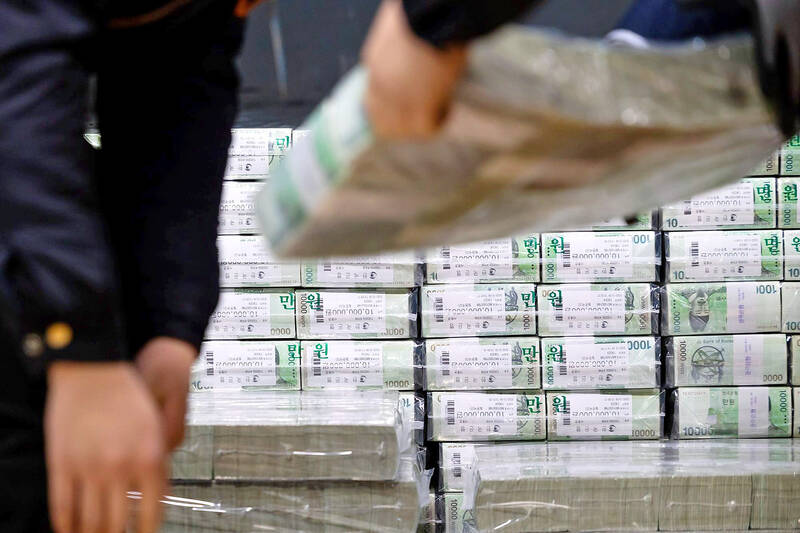The South Korean won’s near 17 percent rally since late October last year may be reaching its final stages as signs of a weaker economic outlook contrast with optimism over other emerging-market peers.
Falling demand for semiconductors is set to weigh on exports at a time when alarm bells are sounding about South Korea losing a global chip war.
The focus is to be on fourth-quarter growth data due on Thursday after the Bank of Korea governor suggested last week that economic concerns are surfacing, raising speculation the tightening cycle is winding down.

Photo: Bloomberg
Along with other headwinds such as the current account deficit and technical factors, this does not leave much scope for the won to gain and primes investors for a potential shift to other currencies such as the Thai baht. The South Korean currency was the best performer in Asia in the fourth quarter of last year.
While the currency might benefit from the Chinese economy picking up, sluggish exports are expected to drag on the won, ING Bank NV economist Min Joo Kang said.
“For the near term, probably appreciation elements will drive a stronger USD/KRW,” she added.
In addition, Min expects South Korea to post a current-account gap this quarter, putting more pressure on the won.
ING sees the won ending the quarter at 1,230 versus the US dollar, compared with 1,235.55 on Friday.
The won has strengthened, along with emerging-market peers, from late October on signs the US Federal Reserve may be nearing its terminal rate with inflation slowing.
Rising equity inflows amid improving risk sentiment aided by China’s re-opening also helped.
However, South Korea is struggling with a property-market downturn, and other positives for the won may be fading as Bank of Korea seems to have either reached, or be nearing the end of its rate hike cycle.
“There is room for more won strength during the remainder of the first quarter, but given how fast the currency has gained recently, the scope of the rally won’t be too big,” said SK Securities Co economist An Young-jin, who sees USD/KRW at 1,220 at the end of March.

Taiwan Semiconductor Manufacturing Co (TSMC, 台積電) founder Morris Chang (張忠謀) yesterday said that Intel Corp would find itself in the same predicament as it did four years ago if its board does not come up with a core business strategy. Chang made the remarks in response to reporters’ questions about the ailing US chipmaker, once an archrival of TSMC, during a news conference in Taipei for the launch of the second volume of his autobiography. Intel unexpectedly announced the immediate retirement of former chief executive officer Pat Gelsinger last week, ending his nearly four-year tenure and ending his attempts to revive the

Taiwan would remain in the same international network for carrying out cross-border payments and would not be marginalized on the world stage, despite jostling among international powers, central bank Governor Yang Chin-long (楊金龍) said yesterday. Yang made the remarks during a speech at an annual event organized by Financial Information Service Co (財金資訊), which oversees Taiwan’s banking, payment and settlement systems. “The US dollar will remain the world’s major cross-border payment tool, given its high liquidity, legality and safe-haven status,” Yang said. Russia is pushing for a new cross-border payment system and highlighted the issue during a BRICS summit in October. The existing system

Convenience store operator Lawson Inc has registered trademarks in Taiwan, sparking rumors that the Japanese chain is to enter the local market. The company on Aug. 30 filed trademarks for the names Lawson and Lawson Station, according to publicly available information from the Ministry of Economic Affairs’ Intellectual Property Office. The product categories on the application include some of Lawson’s top-selling items for use in the convenience store market. The discovery has led to speculation online that the popular Japanese chain is to enter the Taiwanese market. However, some pointed out that it might be a preemptive application to avoid others from co-opting the

Taiwan Semiconductor Manufacturing Co (TSMC, 台積電) is expected to grow its revenue by about 25 percent to a new record high next year, driven by robust demand for advanced technologies used in artificial intelligence (AI) applications and crypto mining, International Data Corp (IDC) said yesterday. That would see TSMC secure a 67 percent share of the world’s foundry market next year, from 64 percent this year, IDC senior semiconductor research manager Galen Zeng (曾冠瑋) predicted. In the broader foundry definition, TSMC would see its market share rise to 36 percent next year from 33 percent this year, he said. To address concerns